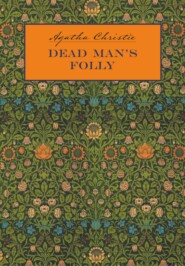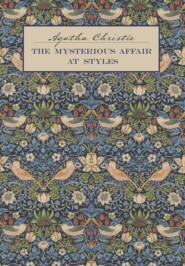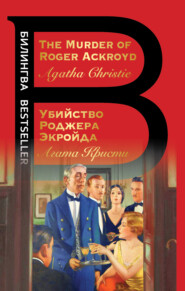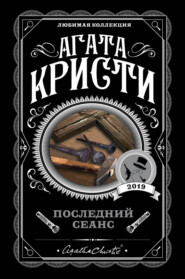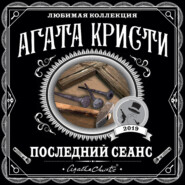По всем вопросам обращайтесь на: info@litportal.ru
(©) 2003-2024.
✖
Five Little Pigs
Автор
Год написания книги
2019
Настройки чтения
Размер шрифта
Высота строк
Поля
Depleach stared at him.
‘They’ve fed her meat all right,’ he said. ‘She’s been a go-getter. She’s had three husbands since then. In and out of the divorce court as easy as you please. And every time she makes a change, it’s for the better. Lady Dittisham—that’s who she is now. Open any Tatler and you’re sure to find her.’
‘And the other two?’
‘There was the governess woman. I don’t remember her name. Nice capable woman. Thompson—Jones—something like that. And there was the child. Caroline Crale’s half-sister. She must have been about fifteen. She’s made rather a name for herself. Digs up things and goes trekking to the back of beyond. Warren—that’s her name. Angela Warren. Rather an alarming young woman nowadays. I met her the other day.’
‘She is not, then, the little pig who cried Wee Wee Wee…?’
Sir Montague Depleach looked at him rather oddly. He said drily:
‘She’s had something to cry Wee-Wee about in her life! She’s disfigured, you know. Got a bad scar down one side of her face. She—Oh well, you’ll hear all about it, I dare say.’
Poirot stood up. He said:
‘I thank you. You have been very kind. If Mrs Crale did not kill her husband—’
Depleach interrupted him:
‘But she did, old boy, she did. Take my word for it.’
Poirot continued without taking any notice of the interruption.
‘Then it seems logical to suppose that one of these five people must have done so.’
‘One of them could have done it, I suppose,’ said Depleach, doubtfully. ‘But I don’t see why any of them should. No reason at all! In fact, I’m quite sure none of them did do it. Do get this bee out of your bonnet, old boy!’
But Hercule Poirot only smiled and shook his head.
Chapter 2 (#ulink_138b1e4d-0797-5af4-8dc0-485faa7fda1a)
Counsel for the Prosecution (#ulink_138b1e4d-0797-5af4-8dc0-485faa7fda1a)
‘Guilty as Hell,’ said Mr Fogg succinctly.
Hercule Poirot looked meditatively at the thin clear-cut face of the barrister.
Quentin Fogg, K.C. was a very different type from Montague Depleach. Depleach had force, magnetism, an over-bearing and slightly bullying personality. He got his effects by a rapid and dramatic change of manner. Handsome, urbane, charming one minute—then an almost magical transformation, lips back, snarling smile—out for your blood.
Quentin Fogg was thin, pale, singularly lacking in what is called personality. His questions were quiet and unemotional—but steadily persistent. If Depleach was like a rapier, Fogg was like an auger. He bored steadily. He had never reached spectacular fame, but he was known as a first-class man on law. He usually won his cases.
Hercule Poirot eyed him meditatively.
‘So that,’ he said, ‘was how it struck you?’
Fogg nodded. He said:
‘You should have seen her in the box. Old Humpie Rudolph (he was leading, you know) simply made mincement of her. Mincemeat!’
He paused and then said unexpectedly:
‘On the whole, you know, it was rather too much of a good thing.’
‘I am not sure,’ said Hercule Poirot, ‘that I quite understand you?’
Fogg drew his delicately marked brows together. His sensitive hand stroked his bare upper lip. He said:
‘How shall I put it? It’s a very English point of view. “Shooting the sitting bird” describes it best. Is that intelligible to you?’
‘It is, as you say, a very English point of view, but I think I understand you. In the Central Criminal Court, as on the playing fields of Eton, and in the hunting country, the Englishman likes the victim to have a sporting chance.’
‘That’s it, exactly. Well, in this case, the accused didn’t have a chance. Humpie Rudolph did as he liked with her. It started with her examination by Depleach. She stood up there, you know—as docile as a little girl at a party, answering Depleach’s questions with the answers she’d learnt off by heart. Quite docile, word perfect—and absolutely unconvincing! She’d been told what to say and she said it. It wasn’t Depleach’s fault. That old mountebank played his part perfectly—but in any scene that needs two actors, one alone can’t carry it. She didn’t play up to him. It made the worst possible effect on the jury. And then old Humpie got up. I expect you’ve seen him? He’s a great loss. Hitching his gown up, swaying back on his feet—and then—straight off the mark!
‘As I tell you, he made mincemeat of her! Led up to this and that—and she fell into the pitfall every time. He got her to admit the absurdities of her own statements, he got her to contradict herself, she floundered in deeper and deeper. And then he wound up with his usual stuff. Very compelling—very convinced: “I suggest to you, Mrs Crale, that this story of yours about stealing coniine in order to commit suicide is a tissue of falsehood. I suggest that you took it in order to administer it to your husband who was about to leave you for another woman, and that you did deliberately administer it to him.” And she looked at him—such a pretty creature—graceful, delicate—and she said: “Oh, no—no, I didn’t.” It was the flattest thing you ever heard—the most unconvincing. I saw old Depleach squirm in his seat. He knew it was all up them.’
Fogg paused a minute—then he went on:
‘And yet—I don’t know. In some ways it was the cleverest thing she could have done! It appealed to chivalry—to that queer chivalry closely allied to blood sports which makes most foreigners think us such almighty humbugs! The jury felt—the whole court felt—that she hadn’t got a chance. She couldn’t even fight for herself. She certainly couldn’t put up any kind of a show against a great big clever brute like old Humpie. That weak, unconvincing: “Oh no—no, I didn’t,” it was pathetic—simply pathetic. She was done for!
‘Yes, in a way, it was the best thing she could have done. The jury were only out just over half an hour. They brought her in: Guilty with a recommendation to mercy.
‘Actually, you know, she made a good contrast to the other woman in the case. The girl. The jury were unsympathetic to her from the start. She never turned a hair. Very good looking, hard-boiled, modern. To the women in the court she stood for a type—type of the home-breaker. Homes weren’t safe when girls like that were wandering abroad. Girls damn full of sex and contemptuous of the rights of wives and mothers. She didn’t spare herself, I will say. She was honest. Admirably honest. She’d fallen in love with Amyas Crale and he with her, and she’d no scruples at all about taking him away from his wife and child.
‘I admired her in a way. She had guts. Depleach put in some nasty stuff in cross-examination and she stood up well to it. But the court was unsympathetic. And the judge didn’t like her. Old Avis, it was. Been a bit of a rip himself when young—but he’s very hot on morality when he’s presiding in his robes. His summing up against Caroline Crale was mildness itself. He couldn’t deny the facts but he threw out pretty strong hints as to provocation and all that.’
Hercule Poirot asked:
‘He did not support the suicide theory of the defence?’
Fogg shook his head.
‘That never really had a leg to stand upon. Mind you, I don’t say Depleach didn’t do his best with it. He was magnificent. He painted a most moving picture of a great-hearted, pleasure-loving, temperamental man, suddenly overtaken by a passion for a lovely young girl, conscience stricken, yet unable to resist. Then his recoil, his disgust with himself, his remorse for the way he was treating his wife and child and his sudden decision to end it all! The honourable way out. I can tell you, it was a most moving performance; Depleach’s voice brought tears to your eyes. You saw the poor wretch torn by his passions and his essential decency. The effect was terrific. Only—when it was all over—and the spell was broken, you couldn’t quite square that mythical figure with Amyas Crale. Everybody knew too much about Crale. He wasn’t at all that kind of man. And Depleach hadn’t been able to get hold of any evidence to show that he was. I should say Crale came as near as possible to being a man without even a rudimentary conscience. He was a ruthless, selfish, good-tempered happy egoist. Any ethics he had would have applied to painting. He wouldn’t, I’m convinced, have painted a sloppy, bad picture—no matter what the inducement. But for the rest, he was a full-blooded man and he loved life—he had a zest for it. Suicide? Not he!’
‘Not, perhaps, a very good defence to have chosen?’
Fogg shrugged his thin shoulders. He said:
‘What else was there? Couldn’t sit back and plead that there was no case for the jury—that the prosecution had got to prove their case against the accused. There was a great deal too much proof. She’d handled the poison—admitted pinching it, in fact. There was means, motive, opportunity—everything.’
‘One might have attempted to show that these things were artificially arranged?’
Fog said bluntly:
‘She admitted most of them. And, in any case, it’s too far-fetched. You’re implying, I presume, that somebody else murdered him and fixed it up to look as though she had done it.’
‘You think that quite untenable?’
Fogg said slowly:






